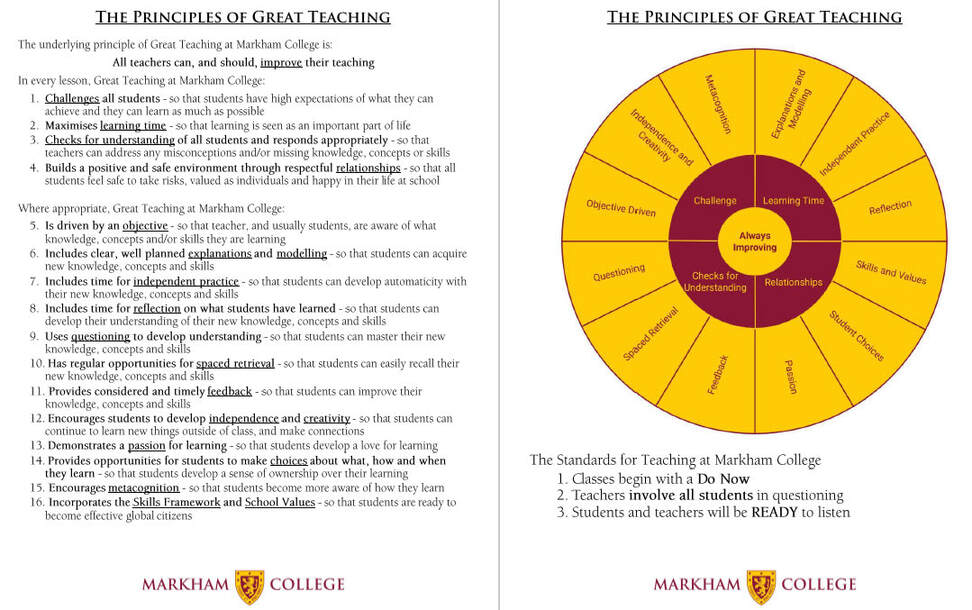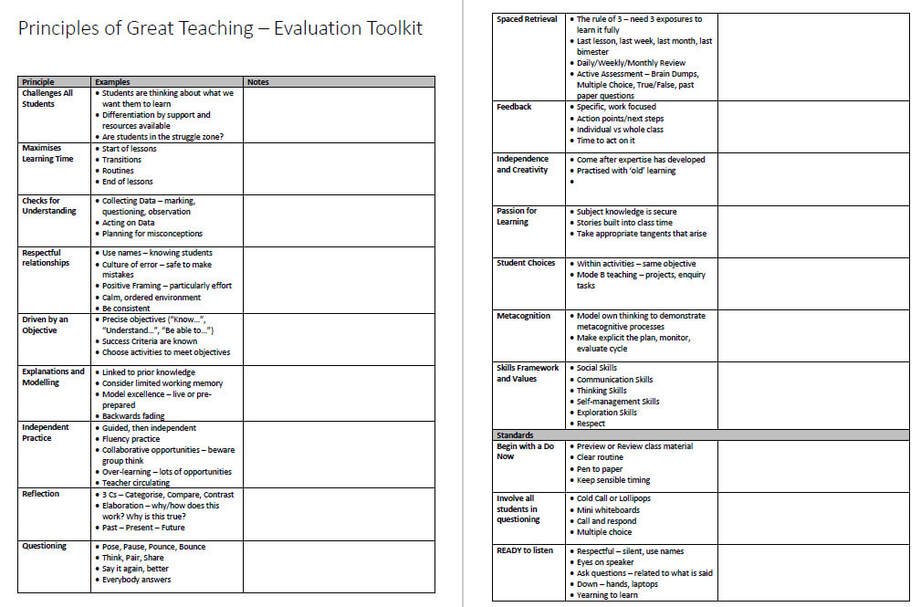- Most teachers and school leaders think they know what makes great teaching, but they don't;
- Most teachers and school leaders think they know what it takes to improve teaching, but they don't;
- Most teachers and school leaders think that teaching in their classroom/department/school is good enough, but it isn't.
"Hard work and effective teaching are not the same thing. Neither are hard work and effective leadership." |
"As a reaction to their experience of poor teaching, their solution is to minimise the role of the teacher in teaching and learning processes and maximise the role of students. Accordingly, they advocate the importance of students leading their own learning." |
- Knowledge - everything is built upon this
- Memory - how working and long term memory work
- Thinking - "Thinking is the interaction of knowledge, from our environment and our long term memory"
- Learning - a change in long term memory
- Retrieval - retrieving memories strengthens the memories
- Understanding - see quote below
- Schema - complex knowledge constructs
"Understanding happens when knowledge takes on meaning. When we experience new knowledge, whether or not it has meaning to us will depend on the knowledge we already have. In other words, the more knowledge we have, the more likely we are to understand something new." |
- What Makes Great Teaching, Robert Coe et al
- Formative Assessment, Dylan Wiliam
- Effect Sizes, John Hattie
- Principles of Instruction, Barak Rosenshine
- Why Don't Students Like School, Daniel Willingham
"I suggest that great teaching is that which typically focuses on teaching knowledge, using pedagogies which are best for teaching knowledge (direct-interactive instruction and formative assessment), by teachers who have a strong knowledge of what they are teaching and how students typically think about this, and who develop strong relationships with their students." |
Great Teaching
- Great teaching
- Hard work on the part of the student
"Great teaching requires deep knowledge and skills in relation to pedagogy." |
- Activities that require students to recall knowledge from previous lessons, which may or may not be relevant to this lesson, but which needs to be learned as part of the course;
- Clear communication and use of learning intentions and success criteria;
- Activities that allow the teacher to find out what students know or can do already (in relation to what is being taught in this lesson);
- Clear teacher explanations and demonstrations which hold student attention;
- Activities that allow students to put into practice what they are being taught;
- Appropriate levels of support and challenge;
- Use of questions to make students think and to check for understanding;
- Activities that get students to discuss and learn with other students;
- Clear feedback to individual students and to the class about their learning;
- Activities that evaluate the impact of lessons;
- Strong teacher-student relationships;
- High expectations and standards for student behaviour and quality of work.
"It is often quite striking to me just how many teachers are reluctant to actually 'teach'." |
Improving Teaching
"Teachers are unlikely to improve a particular element of their teaching practice unless attention is drawn to the fact that they could be improved or need to improve." |
"learning should be the core business for everyone involved in the life of a school - students, teachers, school leaders and support staff" |
- Professional autonomy
- Consistency
- Building a common understanding of great teaching
- Self-evaluation of lessons
- Planning of lessons
- Focusing feedback in observations
- Peer observations
- Focusing INSET sessions
"Use of the Lesson Evaluation Toolkit in lesson planning is not about making all lessons look the same - it is about getting all teachers to think about the same pedagogy as part of their planning." |
- By a leader (to provide useful feedback to the teacher, to provide feedback to the leader about areas of development, and NOT as a way to make judgements)
- By a peer (to inspire the observer, to provide feedback to the teacher, to share good practice)
"I actually believe that giving feedback to teachers about teaching practice is one of the most important things that school leaders can do with their time." |
- No feedback is given to teachers;
- The feedback is poor;
- The person giving feedback isn't confident about delivering it (that is, it is delivered poorly);
- Nothing is done with the feedback.
"Use of your school Lesson Evaluation Toolkit can help to create a degree of consistency in the feedback given to teachers following an observed lesson." |
"If you try to improve too many things at any one time, the likelihood is that you won't improve anything, certainly not to any significant extent. " |
- Areas of weakness across the whole school, which should then inform further improvement planning;
- Areas of strength of particular teachers, who can be used as examples for other teachers to learn from.
"the overall quality of lessons is not being evaluated. Instead, it is specific pedagogical elements of lessons that are being thought about, as identified in the school's Lesson Evaluation Toolkit." |
"it is important that the focus is on improving the 'right' things. Without a focus on the right things, teachers and school leaders will be working hard but their efforts are likely to be in vain." |
- Pedagogy
- Attainment
- Curriculum
- Ethos
- Too much time is spent on other priorities
- Too much time is spent on 'dealing with things' which could be dealt with by others
- They don't know how to improve teaching quality
- They believe that teaching is good enough
- They believe that teachers will take care of their own improvement and that leaders don't have a role in this
- Make improvement of teaching the number 1 priority
- Develop a shared understanding of great teaching
- Focus professional learning on pedagogy
- Lead by example
- Read a lot
- Observe lessons a lot
- Support and challenge teachers to improve
- Make time for people
- Take different approached with different colleagues
- Recognise strengths and good practice
- Have difficult conversations when necessary
- Talk about teaching and learning
- Invest time and resources in collaborative professional learning
- Plan for improvement taking into account data
The Lesson Evaluation Toolkit and The Principles of Great Teaching
"A push for a shared understanding of what great teaching is and what typical features of high-quality lessons are is not the same thing as a push for every teacher to teach in exactly the same way." |


 RSS Feed
RSS Feed
